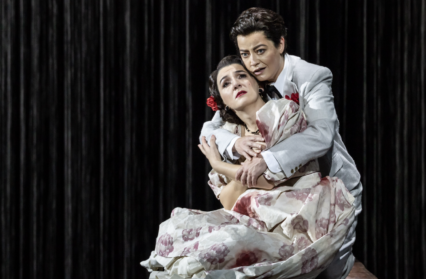Paul Chambers reviews Welsh National Opera’s production of Osvaldo Golijov’s Ainadamar.
The title of WNO’s latest co-production takes its name from a spring in the hills of the Andalusian city of Granada, where it is believed the great Spanish poet, Federico Garcia Lorca was executed by firing squad. Ainadamar is an Arabic word, translated as the ‘fountain of tears’. It is the unrelenting sorrow that the title evokes that permeates each passage of Osvaldo Golijov’s opera. This is an enactment of pain, longing, loss, and mourning.
The opera’s narrative is essentially the dramatisation of the memories of actress Margarita Xirgu, a close friend and muse of Lorca’s, to whom he dedicated the play, Mariana Pineda. Through a series of flashbacks, Margarita recounts the circumstances of Lorca’s death to a young student under her tutelage, Nuria. Following the poet’s execution, Margarita has taken it upon herself to keep the fire of his work alive through her replaying of the title character of Mariana Pineda. We find her in 1969, about to embark on another performance in the role.
Pineda was a 19th century political martyr and a lifelong inspiration for Lorca. It is within the soul of Pineda that the opera effectively binds Lorca’s and Margarita’s fates together. The Chorus darkly laments Mariana in the production’s opening sequences, a fatalistic foreshadowing of the fates of the opera’s two central protagonists. The way in which Mariana’s lament is continued after the passing of Lorca and Margarita is a powerful invocation of the opera’s celebration of hope and idealism, even in the midst of such devastating social and political forces.
In many ways, the opera could be seen as a Passion Play. Hannah Hipp’s sensually lyric portrayal of Lorca frames the poet within the androgynous mythical qualities of a universal saviour. His politically-motivated execution, followed by Margarita’s relentless mourning in the space of the Virgin Mary, offer a fatalistic mirror of the agonies of Calvary. The metaphoric fountain of tears that flows through the opera is physically evoked by a long drapery that forms a centre-stage circle, wherein the majority of the play’s action is centred. It’s visual suggestion of a bull-ring, enhanced by the stunning projection work of Tal Rosner, enraptures the characters in both a veil of memory and an arena of violence.
The haunting presence of flamenco is felt throughout the production, through various elements of dance, and the measured, sparing employment of guitar and percussion. However, there is little in terms of actual flamenco performance. As a form of dance, it is employed more for its conceptually expressive power, rather than its impulsive, elemental physicality. The form finds it literal voice in the performance of Alfredo Tejada, in the role of Falangist Ruiz Alonso, who’s acute melisma punctuates the opera’s dream-like darkness.
Given the immense influence the lyric of flamenco had on Lorca, it is perhaps a shame that it’s presence as song is given only to the opera’s antagonist force. That said, throughout the production of Ainadamar we are reminded both aurally and visually of the immense power of Lorca’s poetry. The libretto itself, by David Henry Hwang, could be seen to resemble an early Lorca poem, with its repeated refrains – it was a sad day in Granada; the stones began to cry… – and romantic sensuality, coloured by the presence of death. At the climax of the performance, a vivid flurry of lines from Lorca’s poetry is projected to stunning effect onto the on-stage stage drapery.
Central to the spirit of Ainadamar are the dreams and ideals that Lorca and Margarita share for Spain’s future, and their bravery to commit to these values in the face of oppressive forces. The tremendous sensory and emotional staging of Lorca’s death, and Jaquelina Livieri’s anguished outpourings of Margarita’s repentant defiance in the opera’s closing passages, are the climactic realisation of the themes of courage and tragedy that underpin the opera. Director Deborah Colker’s outstanding achievement in this work is the profoundly resonant chord she strikes in the balancing of these two themes.












